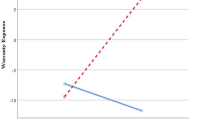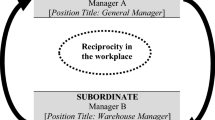Abstract
Organizations are increasingly embedded with consultants and other non-employees who have the opportunity to engage in wrongdoing. However, research exploring the reporting intentions of employees regarding the discovery of wrongdoing by consultants is scant. It is important to examine reporting intentions in this setting given the enhanced presence of consultants in organizations and the fact that wrongdoing by consultants changes a key characteristic of the wrongdoing. Using an experimental approach, the current paper reports the results of a study examining employees’ reporting intentions subsequent to their discovery of wrongdoing by a consultant. The results of the study indicate that perceptions about the seriousness of a wrongdoing, personal costs and personal responsibility related to reporting a wrongdoing, and moral-equity judgments are significantly associated with reporting intentions for a normal (non-anonymous) reporting channel. Only perceptions of seriousness and personal costs are significantly associated for an anonymous reporting channel. Lastly, while personal costs for the anonymous reporting channel were lower than the normal reporting channel, reporting intentions were similar across the two channels.
Similar content being viewed by others
References
InstitutionalAuthorNameAberdeen Group (2002) Worldwide IT spending 2003–2006: Measuring the Incremental Recovery Boston MA
L. M. Baynes (2002) ArticleTitle‘Just puck and Blow? An Analysis of Corporate Whistblowers the Duty of Care and the Duty of Loyalty, and the Sarbanes-Oxley Act’ St. John’s Law Review 76 875–896
T. Beauchamp (1982) Philosophical Ethics McGraw-Hill New York
Brief, A. P. and S. Modwidlo: 1986, ‘Prosocial Organizational Behaviors’, Academy of Management Review 710–725.
E. S. Callahan T. M. Dworkin T. L. Fort C. A. Schipani (2002) ArticleTitle‘Integrating Trends in Whistleblowing and Corporate Governance: Promoting Organizational Effectiveness, Societal Responsibility, and Employee Empowerment’ American Business Law Journal 40 177–196 Occurrence Handle10.1111/j.1744-1714.2002.tb00913.x
R. K. Chiu (2003) ArticleTitle‘Ethical Judgment and Whistleblowing Intention: Examining the Moderating Role of Locus of Control’ Journal of Business Ethics 43 65–74
Cohen, J. R., L. W. Pant and D. J. Sharp: 1996, ‘Measuring the Ethical Awareness and Ethical Orientation of Canadian Auditors’, Behavioral Research in Accounting (Suppl), 98–119.
Cohen, J. R., L. W. Pant and D. J. Sharp: 1998, ‘The Effect of Gender and Academic Discipline Diversity on the Ethical Evaluations, Ethical Intentions and Ethical Orientation of Potential Public Accounting Recruits’, Accounting Horizons, 250–270.
Touche Deloitte (1999) ArticleTitle‘Maximizing the Value of ERP-Enabled Processes’ The Review (January 18) 1–3
Dozier, J. B. and M. P. Miceli: 1985, ‘Potential Predictors of Whistle-Blowing: A Prosocial Behavior Perspective’, Academy of Management Review, 823–836.
Dworkin, T. M. and J. P. Near: ‘A Better Statutory Approach to Whistle-Blowing’, Business Ethics Quarterly 7, 1–16.
Flory, S. M., T. J. Phillips, Jr., E. Reidenbach and D. P. Robin: 1992, ‘A Multidimensional Analysis of Selected Ethical Issues in Accounting’, The Accounting Review (April), 284–302.
Graham, J. W.: 1986, ‘Principled Organizational Dissent: A Theoretical Essay’, Research in Organizational Behavior 1–52.
C. Grant (2002) ArticleTitle‘Whistle Blowers: Saints of Secular Culture’ Journal of Business Ethics 39 391–399
Gundlach, M. J., S. C. Douglas and M. J. Martinko: 2003, ‘The Decision to Blow the Whistle: A Social Information Processing Framework’, Academy of Management Review (January), 107–123.
Hooks. K. L., S. E. Kaplan and J. J. Schultz, Jr.: 1994, ‘Enhancing Communication to Assist in Fraud Prevention and Detection’, Auditing: A Journal of Practice & Theory (Fall), 86–117.
Jensen, M. and W. Meckling: 1976, ‘Theory of the Firm: Managerial Behavior, Agency Costs, and Ownership Structure’, Journal of Financial Economics, 305–360.
S. E. Kaplan (1995) ArticleTitle‘An Examination of Auditors’ Reporting Intentions Upon Discovery of Procedures Prematurely Signed-Off’ Auditing: A Journal of Practice & Theory Fall 90–104
S. E. Kaplan S. M. Whitecotton (2001) ArticleTitle‘An Examination of Auditors’ Reporting Intentions When Another Auditor is Offered Client Employment’ Auditing: A Journal of Practice & Theory Spring 45–64 Occurrence Handle10.2308/aud.2001.20.1.45
J. P. Keenan (2002) ArticleTitle‘Whistleblowing: A study of Managerial Differences’ Employee Responsibilities and Rights Journal 14 17–32
G. King SuffixIII. (1997) ArticleTitle‘The Effects of Interpersonal Closeness and Issue Seriousness on Blowing the Whistle’ Journal of Business Communications 34 419–436
G. King SuffixIII. (1999) ArticleTitle‘The Implications of an Organization’s Structure on Whistleblowing’ Journal of Business Ethics 20 315–326
Koch, C.: 2002, ‘It’s Time to Take Control’, CIO Magazine (online) (July 15), www.cio.com/archive/071502/control.html.
Miceli, M. P. and J. P. Near: 2002, ‘What Makes Whistle-Blowers Effective? Three Field Studies’, Human Relations 455–479.
M. P. Miceli J. P. Near (1992) Blowing the Whistle: The Organizational and Legal Implications for Companies and Employees Lexiington Books New York
Miceli, M. P. and J. P. Near: 1985, ‘Characteristics of Organizational Climate and Perceived Wrongdoing Associated with Whistle-Blowing Decisions’, Personnel Psychology, 525–544.
Miceli, M. P. and J. P. Near: 1984, ‘The Relationships Among Beliefs, Organizational Position, and Whistleblowing Status: A Discriminant Analysis’, Academy of Management Journal, 687–705.
Miceli, M. P., J. P. Near and C. R. Schwenk: 1991, ‘Who Blows The Whistle and Why?’, Industrial and Labor Relations Review, 113–130.
J. P. Near T. M. Dworkin (1998) ArticleTitle‘Responses to Legislative Changes: Corporate Whistleblowing Policies’ Journal of Business Ethics 17 1551–1561
Near, J. P. and M. P. Miceli: 1995, ‘Effective Whistle-Blowing’, Academy of Management Review, 679–708.
J. P. Near M. P. Miceli (1985) ArticleTitle‘Organizational Dissidence: The Case of Whistle-Blowing’ Journal of Business Ethics 4 1–16
Near, J. P. and M. P. Miceli: 1983, ‘The Whistle-Blowing process: Retaliation and Perceived Effectieness’, Work and Organizations, 3–28.
Near, J. P. and M. P. Miceli: 1987, ‘Whistle-Blowers in Organizations: Dissidents or Reformers?’, Research in Organizational Behavior, 321–368.
J. P. Near M. T. Rehg J. R. VanScotter M. P. Miceli (2004) ArticleTitle‘Does Type of Wrongdoing Affect the Whistle-Blowing Process?’ Business Ethics Quarterly 14 219–242
Overby, S: 2003, “Staff alert”. CIO Magazine online (May 1), http://www.cio.com/archive/050103/staffing.html.
L. A. Ponemon (1994) ArticleTitle‘Comment “Whistleblowing as an internal control mechanism: individual and organizational considerations”’ Auditing: A Journal of Practice & Theory (Fall) 118–130
J. Rawls (1971) A Theory of Justice Harvard University Press Cambridge, MA
Reidenbach, R. and D. Robin: 1988, ‘Some Initial Steps Towards Improving the Measurement of Ethical Evaluations of Marketing Activities’, Journal of Business Ethics, 871–879.
R. E. Reidenbach D. P. Robin (1990) ArticleTitle‘Toward the Development of a Multidimensional Scale for Improving Evaluations of Business Ethics’ Journal of Business Ethics 9 639–653
S. L. Robinson R. J. Bennett (1995) ArticleTitle‘A Typology of Deviant Workplace Behaviors: A Multidimensional Scaling Study’ Academy of Management Journal 38 555–572
Schultz, Jr., J. J., D. A. Johnson, D. Morris and S. Dyrnes: 1993, ‘An Investigation of the Reporting of Questionable Acts in an International Setting’, Journal of Accounting Research (Suppl), 75–103.
Singer, M., S. Mitchell and J. Turner: 1998, ‘Consideration of Moral Intensity in Ethicality Judgments: Its Relationship with Whistle-Blowing and Need-For-Cognition’, Journal of Business Ethics, 527–541.
M. J. Somers J. C. Casal (1994) ArticleTitle‘Organizational Commitment and Whistle-Blowing: A Test of the Reformer and the Organization Man Hypotheses’ Group & Organization Management (September) 270–284
A. A. Tavakoki J. P. Keenan B. Crnjak-Karanovic (2003) ArticleTitle‘Culture and Whistleblowing: An Empirical Study of Croatian and United States Managers Utiilizing Hofstede’s Cultural Dimensions’ Journal of Business Ethics 43 49–64
B. Tuttle A. Harrell P. Harrison (1997a) ArticleTitle‘Moral Hazard Ethical Considerations and The Decision to Implement an Information System’ Journal of Management Information Systems Spring 7–27
B. Tuttle A. Harrell C. Jackson (1997b) ArticleTitle‘Incentive to Shirk, Privately Held Information, and the Decision to Implement an Information System with Known Quality Problems’ Advances in Accounting Information Systems 5 147–165
Author information
Authors and Affiliations
Corresponding author
Additional information
Susan Ayers is an Associate Professor of Accounting at the University of San Diego, where she has been a faculty member since 2000. Previously, she served on the faculty at the University of Tennessee in Knoxville. She received her Ph.D. from Arizona State University. She has published in journals such as Auditing: A Journal of Practice Theory, Accounting Horizons, Information Systems Audit and Control Journal, and ABACUS. She teaches undergraduate and graduate classes in Accounting Information Systems. Her primary research interests involve the investigation of judgment and decision making in information systems environments.
Steve Kaplan is a Professor of Accounting at Arizona State University, where he has been a member of the faculty since 1981. He received his Ph.D. from the University of Illinois. He has published widely in journals such as The Accounting Review, Journal of Accounting Research, Journal of Accounting and Public Policy, Business Ethics Quarterly, and Journal of Business Ethics. He is the previous editor of Behavioral Research in Accounting, a section journal of the American Accounting Association. His primary research interests are behavioral issues, judgement and decision making, and ethics.
Rights and permissions
About this article
Cite this article
Ayers, S., Kaplan, S.E. Wrongdoing by Consultants: An Examination of Employees’ Reporting Intentions. J Bus Ethics 57, 121–137 (2005). https://doi.org/10.1007/s10551-004-4600-0
Issue Date:
DOI: https://doi.org/10.1007/s10551-004-4600-0




